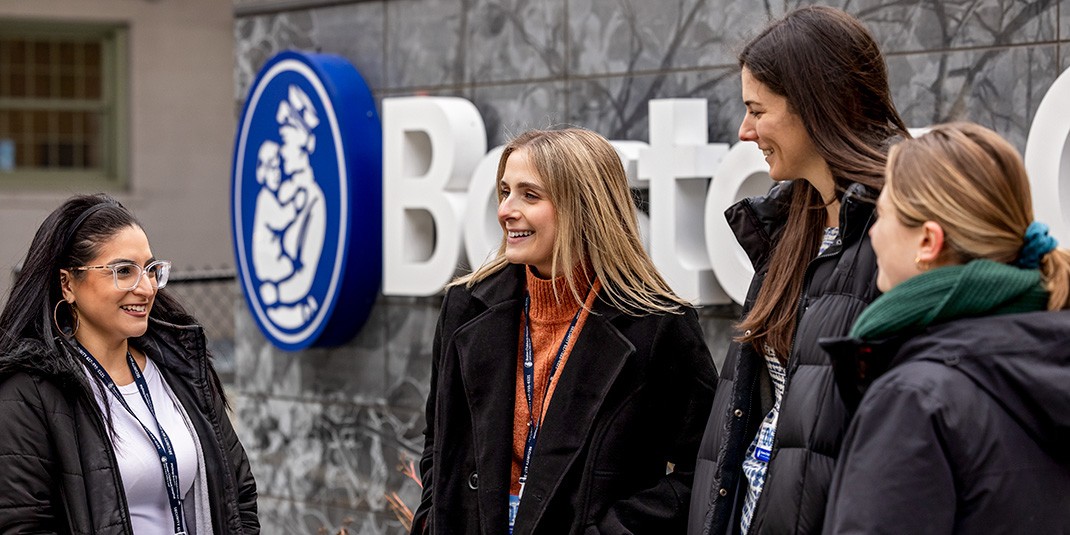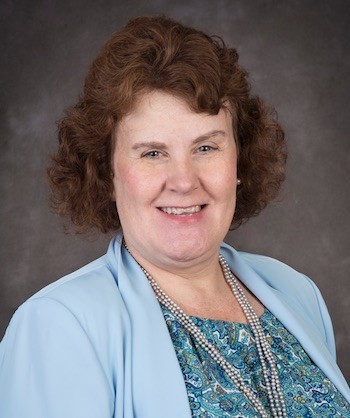
Students chat in front of Boston Children's Hospital. Photo by Caitlin Cunningham for BC News.
Field education in the Boston College School of Social Work bridges the gap between practice and coursework, giving students real-world experience with organizations that complement their career goals.
The school partners with more than 1,000 agencies in Boston and beyond to offer a range of placements, from clinical practice with individuals and families to macro experiences working in the community.
So, how do students find an impactful field placement that fits their interests? What will their schedule look like? And who will support them throughout their journey? We asked Susan Coleman, assistant dean of field education, to give us the low-down.

Susan Coleman, assistant dean of field education.
First and foremost, how does BCSSW match students with field agencies?
The matching process is individualized and supported from the application to the confirmation. An online application asks about the student’s interests, strengths, experiences, family responsibilities, and access to a car—a wide range of questions that allow the team to begin to consider matches.
Your resume is uploaded so we can share it with prospective supervisors. The team facilitates connections with the agencies—students do not need to find practicum experiences on their own. We are always glad to welcome agencies suggested by the student, and we will contact them to ensure they are ready and willing to train students.
What role do you and your colleagues on the field education team play in helping students find the best fit?
All students are assigned to work with an assistant director on the Field Ed team. All assistant directors have received MSW degrees themselves and have years of experience. They are also well connected with many agency partners and have a great range of knowledge about the learning opportunities available.
For the team, it is the substantive conversation that we have at the beginning of the process that allows us to hear from the student and get to know them and their interests. This begins the discernment process, as we move to identify a prospective agency that will be the best match for them. Students will interview with the potential organization and if there is mutual agreement, the placement is confirmed typically a semester ahead of the start of the practicum itself.
How does field education fit into the busy schedule of a full-time MSW student? How do the hours and goals of field education differ between the first and second years of the full-time MSW program?
The first Field year requires 16 hours per week for 30 weeks over the academic year. As it is typically Monday and Tuesday for Field, classes are offered Wednesday through Friday. The final Field year is more demanding as it is 24 hours per week for 30 weeks. It requires a student to be organized, but the consistency of the schedule helps insure that. Most of our students have at least part-time employment and arrange a schedule that is workable for their lives.
How do students earn credit for field education?
Field Education courses run concurrently with practice courses over the course of the program. Field I and II combined award 6 credits; Field III and IV award 8 credits. Successful completion of all four Field courses is required for graduation.
BCSSW has partnered with public schools, medical centers, government agencies, and nonprofit organizations all over the world, enabling students to complete their field education in cities as far flung as Boston and Kampala, Uganda. What makes BCSSW’s approach to field education—and its relationships with agency partners—so special?
The consistent quality of the education provided by BCSSW is well known in the region and with our partners. It puts our students’ resumes on the top of the selection pile for both practicum and for jobs. Our students also show up at agencies with a strong work ethic, a commitment to purposeful work, and a willingness to learn that sets them apart. We also receive consistent feedback from our agency partners that the support and guidance they receive from the Field team and from the advisor cohort is excellent, and it is cited as one reason many agencies maintain a consistent relationship with BCSSW.
As part of their field practicum, students receive active guidance from advisors and field supervisors. What kind of support can students expect to receive from these mentors as they prepare for a career in social work?
One of the richest aspects of social work education is the opportunity to train with and learn from skilled MSW practitioners. The opportunity to see your supervisor in action, to ask them about their career path, to see how they show their social work perspective on a multidisciplinary team—those learning opportunities are priceless in the development of a new practitioner. The advisors in our program work with both the student and the supervisor to provide guidance over the yearlong practicum. They are all experienced MSW practitioners as well and share their experiences as part of their advising role. Mentorship is at the heart the Field practicum experiences.
You say that the training students receive at their agency will enable them to internalize the core values of social work, including service, social justice, and integrity. How do required learning activities, including written assignments, help students explore these values?
The written assignments for the Field Ed courses center around the competencies for social work education. Students are attentive to professionalism, equity, justice and inclusion, policy and research, to name only a few, as it impacts practice. They then use the assignments to illustrate those competencies as experienced in the practicum.
Self-reflection is also a hallmark of the professional and we have designed practicum reflection assignments that help students explore their reactions and responses to the conditions they see and are working to address. The concept of “use of self” is integral to our practice—we must be conscious and aware of who we are, what we bring to the work, and how to use ourselves to further the changes with which we are engaged. We are also very intentional about using a trauma informed lens in Field Education, sharing the importance of self-care as we move through the learning, which can be both inspiring and emotionally challenging.
Social work education intentionally integrates classroom instruction with experiential learning. How do faculty connect practical learning in the field to theoretical learning in the classroom?
Many of the assignments, especially those in the practice courses, will derive directly from the practicum experience. It may be an analysis of the org chart at the agency, a review of their assessment form, a formulation of a best care plan for a client, or an interview with an agency leader. The course lectures and readings also allow for a student to reflect on an interaction from the placement, to deepen their understanding of social conditions or policy implications. It is a constant back and forth between the practicum and class—each provides grounding and curiosity for the other. Practicum learning is the central tenet of social work education—its signature pedagogy. This interplay between classroom learning and experiential application builds a solid foundation to ground our students as they move out into the world as professional Masters level social worker practitioners.


